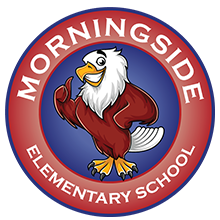School Documents
General School Info
Continuous Improvement Plan
Discipline Plan
Student & Parent Handbook
Parent Involvement Plan
Mobile County Public School System
Local Education Agency (LEA) Parental Involvement Plan
FY 2011-2012 The Mobile County Public School System is committed to a quality education for all students. The Local Educational Agency (LEA) and all schools shall be in accordance with the requirements of the No Child Left Behind Act (NCLB) of 2001. The No Child Left Behind Act of 2001 was signed into law by President George W. Bush on January 8, 2002. This plan was developed in accordance with Section 1118 of the No Child Left Behind Law.
The Mobile County Public School System agrees to implement the following statutory requirements:
- The school district will put into operation programs, activities and procedures for the involvement of parents in all of its schools with Title I, Part A programs, consistent with section 1118 of NCLB. Those programs, activities and procedures will be planned and operated with meaningful consultation with parents of participating children.
- Consistent with section 1118, the school district will work with its schools to ensure that the required school-level parental involvement policies meet the requirements of section 1118(b), and each include, as a component, a school-parent compact consistent with section 1118 9(d) of NCLB. This policy is jointly developed with parents and distributed to parents of participating children.
- The school district will incorporate the district wide parental involvement policy into its Local Educational Agency (LEA) plan. This policy is jointly developed with parents, annually evaluated by parents and distributed to parents.
- In carrying out the Title I, Part A parental involvement requirements, to the extent practicable, the school district and its schools will provide full opportunities for the participation of parents with limited English proficiency, parents with disabilities, and parents of migratory children, including providing information and required school reports in an understandable and uniform format and, including alternative formats upon request in a language parents can understand.
- If the Local Educational Agency (LEA) plan for Title I, Part A, developed under section 1112 of NCLB is not satisfactory to the parents of participating children, the school district will submit any parent comments with the plan when the school district submits the plan to the State Department of Education. A complaint procedure is in place to be used by complainants.
- The school district will involve the parents of children served in Title I, Part A schools in decisions about how the one percent of Title I, Part A funds reserved for parental involvement is spent, and will ensure that not less than 95 percent of the one percent reserved goes directly to the schools.
- The school district will be governed by the following statutory definition of parental involvement, and expects that its Title I schools will carry out programs, activities and procedures in accordance with this definition:
Parental Involvement means the participation of parents in regular, two-way, and meaningful communication involving student academic learning and other school activities, including ensuring:
- (A) that parents play an integral role in assisting their child's learning;
- (B) that parents are encouraged to be actively involved in their child's education at school;
- (C) that parents are full partners in their child's education and are included, as appropriate, in decision making and on advisory committees to assist in the education of their child; and
- (D) the carrying out of other activities, such as those described in section 1118 of NCLB.
The school district will provide the following coordination, technical assistance, and other support to assist Title I, Part A schools in planning and implementing effective parental involvement activities to improve student academic achievement and school performance:
- Central office personnel will coordinate/communicate regularly with administrators and teachers to keep them apprised of federal guidelines, testing information, professional development opportunities and other parenting issues in order to provide school personnel with information they need to communicate to parents. In addition, central office personnel will be available to meet with school personnel and parents as requested to provide technical assistance, support, and/or training. Central office personnel will provide assistance and support during scheduled site and team visits.
- The school district will coordinate and integrate parental involvement strategies Part A with parental involvement strategies through the Pre-Kindergarten, Home Instruction Program for Preschool Youngsters (HIPPY), and Head Start Programs. Parents are encouraged to participate in all parental involvement activities that occur in the system.
- Central office personnel will coordinate the parent-teacher-student partnership conferences that take place in the fall of each year. Parents are provided reports on their child's expectations and actual progress on various statewide assessments. Schools are expected to have 95% or better participation in parent-teacher-student partnership conferences.
- The school district will utilize the quarterly review process to identify barriers to greater participation and assess the effectiveness of the parental participation activities, procedures, and policies as they relate to continuous improvement of schools. œ The school district will provide parent program managers in schools identified as in need of school improvement to ensure the implementation of effective strategies to improve parental involvement. Local schools may fund parent program managers or organizers to ensure the implementation of effective strategies to improve parental involvement.
- Participating schools will submit quarterly baseline data reports to the central office to use in conjunction with the School Action for Excellence (SAE) plan so that it promotes more specifically the improvement of student academic achievement.
- The school district's Office of Home-School-Community Involvement will build the schools' and parents' capacity for strong parental involvement in order to ensure effective involvement of parents and to support a partnership among the schools involved, parents, and the community. Volunteers are solicited from community organizations to act as mentors and tutors. The establishment of parent resource centers in participating schools is strongly encouraged by the school district. Statewide Parenting Day celebrated each year in October.
- The district's quarterly Parent University to communicate with and engage parents and families in small breakout sessions on how to be more involved as partners in the educational process of their children, will provide materials and training to parents of identified students with attendance, truancy and/or discipline concerns to decrease the number of school suspensions and/or referrals, also increase student attendance. This is a collaborative effort between the school district, Helping Families Early Warning Truancy Program and the Juvenile Court System of Mobile County.
The school district will, with the assistance of its Title I, Part A schools, provide assistance to parents of children served by the district, as appropriate, in under- standing topics such as the following:
- the State's academic content standards;
- the State's student academic achievement standards;
- the State and local academic assessments including alternate assessments,
- the requirements of Title I Part A;
- how to monitor their child's progress; and
- how to work with educators.
The school district will, with the assistance of its schools, provide the following support to further foster parental involvement: materials and training to help parents work with their children to improve their children's academic achievement, such as literacy training, the use of technology, as appropriate, and to further foster parental involvement, by:
- school performance profile data
- materials in a language parents can understand
- curriculum description and how student progress is measured
- schedules for partnership conferences
- a welcoming and supportive environment
- providing timely responses to parents' suggestions
- providing family learning nights and GED training
- literacy training
- technology training
- school performance profile data
The school district ensures that a comprehensive system wide process has been implemented for developing School Action for Excellence (SAE) Plans for continuous improvement. A local school committee is established and parents, community leaders, secondary students and appropriate school personnel are represented on this committee. School Action for Excellence (SAE) Plans are reviewed quarterly and available for public review upon request.







